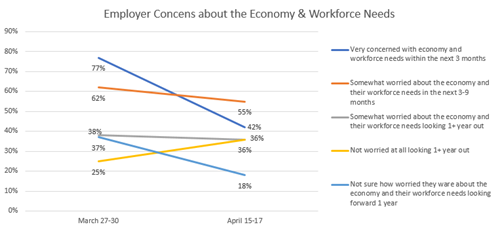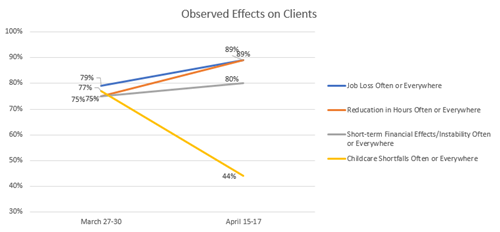Section Navigation
April 28, 2020
Effects of COVID-19 on Partners and Stakeholders
At the end of March and again in mid-April, UpSkill Houston surveyed 88 partners and stakeholders to understand the effects of COVID-19 on their business operations, educational institutions and community programs and their clients.
UpSkill Houston’s March 27-30 survey saw a response rate of just below 50% and its April 15-17 survey a rate of just below 40%. The average breakdown of respondents across both surveys was as follows:
- 39% representing a community-based organization
- 31% representing an employer
- 23% representing a K-12 or community college institution or system
- 7% representing an association or other entity
March responses helped illustrate the most immediate impacts on organizations and individuals, and April results show slight-to-moderate changes in concern and need. Both depict a high level of concern among employers around the economy and workforce needs within the next six months and myriad effects on individuals including short-term financial concerns and job loss.
Respondents in April said they seek labor market and workforce data as well information from officials and business leaders around when and how the region will re-open for business.
Employers Show Economic Concern, Employee Protections
In April, employers indicated slightly less concern around the economy and their workforce needs than they did in March.

In March, employers reported taking measures to establish personal protection measures including disinfecting and reducing common work spaces and implementing on-the-job social distancing. Employers also implemented teleworking plans and increased communications and training.
Employers also reported furloughing employees or reducing their working hours, spending reductions and hiring freezes. But some also shared that they continued to pay employees despite the inability to work and were accommodating employees in difficult situations.
Additional measures reported in April included securing on-site personal protection equipment (PPE) and medical equipment, establishing processes and procedures to address ill or at-risk employees and following procedures outlines in the Coronavirus Aid, Relief and Economic Security (CARES) Act.
Community-Based Organizations See Widespread Client Needs
Nearly all community-based organization and nonprofit respondents reported seeing frequent or widespread short-term financial effects, client job loss, cuts in hours, childcare shortfalls and health care shortfalls. The top three effects reported in March were financial effects, childcare shortfalls and job loss; in April they were cuts in hours, job loss and childcare shortfalls.
The organization respondents represented provide a variety of services such as rent assistance, utilities assistance, food insecurity and essential services, wraparound services, workforce and job placement services, financial services and coaching, education support and childcare services among others.

Additionally, 56% reported somewhat seeing clients experience health care shortfalls in April. In March, 70% reported seeing health care shortfalls often or everywhere.
Respondents anticipate that clients will need employment preparation and placement services, skills development services, financial assistance and sustainability assistance, and technology resources in the near-, mid- and long-term.
In the short-term, clients will need childcare, transportation and food assistance, and high schoolers will need graduation support along with help clarifying post-secondary plans and financial assistance.
In the mid-term, clients will need workforce re-entry and employment assistance, immediate jobs and mental health counseling, as well as transportation help, according to survey results.
Our surveys offer a local perspective against other regional and national impact trends. More than 80% of small business executives report that their operations have been moderately or severely impacted by the pandemic, according to a Greater Houston Partnership survey of member small businesses conducted between April 20-21. About 25% of respondents reported shutting down whole or partial operations.
Gallup reported that polling conducted between April 1-14 showed a record-high of 25% of workers believe they are likely to be laid off within the next year.
Polling conducted by the Strada Education Network between April 15 and April 16, showed that 54% of Americans in the workforce have lost their jobs or income in the last month. According to the poll, 62% of Americans are worried that they will lose their jobs. Additionally, a significant proportion of Americans – 34% – think that if they lose their job they would need to obtain more education to find a comparable one.
Move to Online Coursework Creates Challenges, Opportunities
In March, education respondents began moving classes online or conducting them as hybrid classes and assessing what program “completion” would mean for students – and how to support completion. They also considered whether to adjust the semester’s start and stop dates.
Educators also reported plans to develop processes to conduct lab work and how to reach students without technology at home. Since then, education systems have worked to connect students with emergency services include food and rent assistance, along with providing educational service and support.
The shift to online education presented major instructional challenges with which, in April, education respondents continued to grapple:
- A clear digital divide between students who have the technology and connectivity to access digital learning platforms and curriculum and those who do not; and,
- Challenges in conducting hands-on education and training.
Educational institutions have had to provide tablets or laptops as well as provide internet hot spots to assist students. Teachers have also produced packets for students with no connectivity and are staying in touch with them via phone.
Educators reported difficulties facilitating lab work and necessary hands-on education and training. Now, they worry how students will be able to complete this work and have their skills verified, and how delays in these steps will delay students’ entry into the workforce.
In early April, Gallup noted an annual household income divide of between parents who were more likely to say their children were receiving online distance learning (household incomes of more than $90,000) and parents who said their children were not (household incomes of less than $90,000). These data came from a probability-based Gallup Panel survey conducted via web between April 1 and April 3 and do not represent the experiences of parents without internet, Gallup notes. According to Gallup’s survey, 18% of parents are very concerned that that the online distance learning will have negative impacts on their child’s education and 31% are moderately concerned.
Labor and Workforce Data Will Help Partners Navigate a Path Forward
Uncertain employment conditions for employers and workers are driving the need for current employment figures including what industries and businesses are still hiring, what jobs are still growing and where individuals can connect with these opportunities. This information will help employers, educators and community-based organizations navigate through the next six months.
Additionally, survey respondents representing all areas report that they’d like to connect with other organizations and leaders to share best practices for recovery or to discuss ways in which to work together to connect clients or students with jobs, career opportunities and general support.
